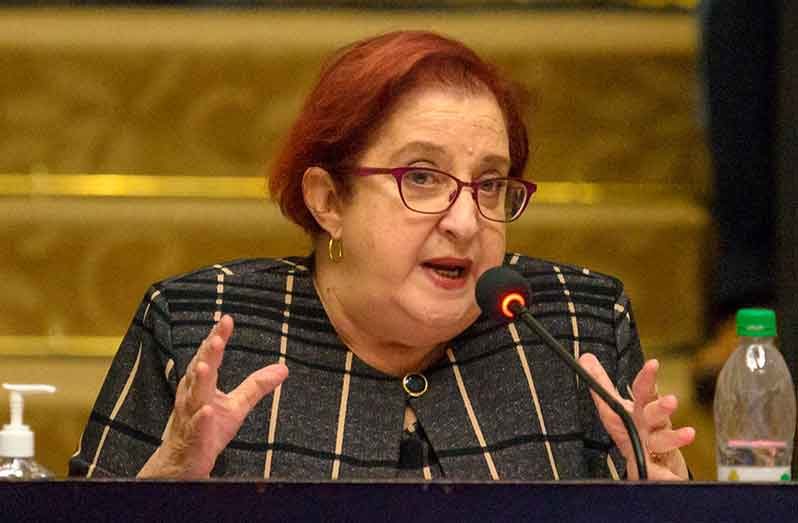–Minister Teixeira tells UN Human Rights Committee
By Feona Morrison
CITIZENS of Guyana are set to “wield their democratic power” to determine the future of the death penalty, as the government pursues constitutional reform, allowing the populace to express their views on the continuation or abolition of capital punishment.
Minister of Parliamentary Affairs and Governance, Gail Teixeira made this disclosure while fielding questions virtually during a review of Guyana’s latest report on the International Covenant on Civil and Political Rights (ICCPR), which is done under the auspicies United Nations Commission on Human Rights (UNCHR), during its 104th session, on Monday.
In response to questions concerning the death penalty, Teixeira said that the matter will need to be brought before Parliament again because neither the Guyana Constitution nor any statutes have removed the death sentence.
She said that the Constitution Reform Commission would lead Guyana’s constitutional-reform process this year and conduct consultations in all 10 administrative regions, including on the retention or abolition of the death penalty.
The minister said that during a similar process conducted from 1999–2001, the general consensus was that the death sentence should continue to be legal, even though it is not being applied.
“There is no view in Guyana right now that we go back to executions of any kind and so it is an ad hoc or informal moratorium that we have maintained from 1997 to now. To further strengthen our argument, the government has put no heads of prison service, no heads of the Ministry of Home Affairs, put any investments of funds into developing any capacity to execute anyone,” Teixeira said.
Further, she related that there is no equipment nor persons trained to execute anyone.
Even though Guyana has not carried out an execution since 1997, judges continue to impose the death penalty. According to Teixeira, the death sentences of criminals are being commuted by the courts. Prior to 2010, all murders carried a mandatory death sentence.
In 2010, Parliament amended the Criminal Law (Offences) Act to do away with this. This means judges now have a discretion to impose jail terms, life imprisonment or the death sentence for murders resulting from specific circumstances.
For instance, the death penalty or life in prison may be imposed upon anyone found guilty of felony murder, killing a member of the Joint Services or Special Constabulary while they are performing their official duties, as well as killing members of the Judiciary and legal officers, witnesses, and jurors/past jurors.
Where a court-imposes life imprisonment, it shall specify the period being not less than 20 years which the convicted person must serve before becoming eligible for parole.
In the case of murder resulting from a person inflicting grievous bodily harm upon another person or through the use of violence, the offender shall be sentenced to imprisonment for life or such other term the court considers appropriate, not being less than 15 years.
In 2022, attorneys contested Guyana’s death penalty for the first time in the Commonwealth Caribbean, claiming it is unconstitutional, excessive, arbitrary, and at odds with the values of the rule of law.
That case concerns three former Coast Guards from the Guyana Defence Force (GDF), Devon Gordon, Deon Greenidge, and Sherwyn Harte, who were found guilty in 2013 of robbing and killing Dweive Kant Ramdass. All three of them received the mandatory death sentence.
The prosecution’s case was that the soldiers robbed Ramdass of $17 million at Caiman Hole in the Essequibo River before tossing him overboard.
The killing occurred between August 20 and August 22, 2009. The three men, who were initially charged on August 24, 2009, then requested in their appeal to the Court of Appeal, that the death sentence be struck down because it is unconstitutional.
However, the court declined to do so and instead resentenced each of them to life in prison when it returned with its decision in December, 2022. While their death sentences were set aside, the appellate court had made it clear that their convictions for the capital offence were affirmed.
Once Harte has served 25 years, he will be eligible for parole. Conversely, Gordon and Greenidge will become eligible after 18 years. The trio’s application for special leave to appeal was dismissed by the Trinidad-based Caribbean Court of Justice (CCJ) last year.
The use of the death penalty in Guyana’s sentencing regime, according to Attorney-General Anil Nandlall, S.C., who had been involved in this criminal appeal, is a manifestation of the will of the Guyanese people exercising their sovereignty.
“The death penalty is neither inconsistent with Guyana’s municipal law, nor [with] its international law obligations. The death penalty has been engrained in Guyana’s constitutional framework from time immemorial, and has been deliberately retained,” he had submitted.
Its continued existence in the face of many constitutional and legislative amendments, he had pointed out, is proof of this.



.jpg)









